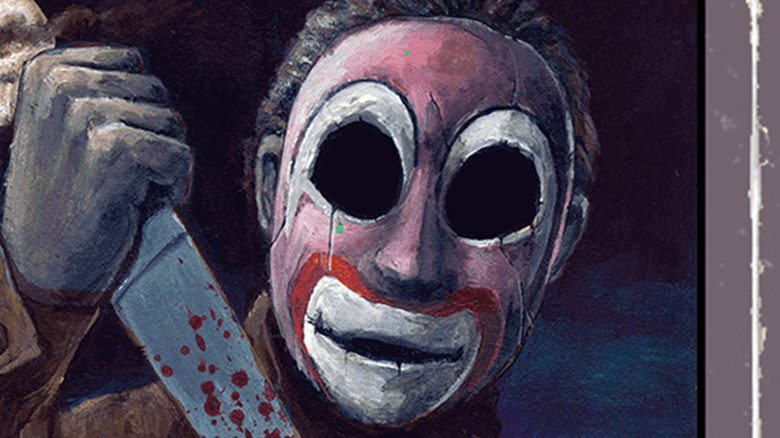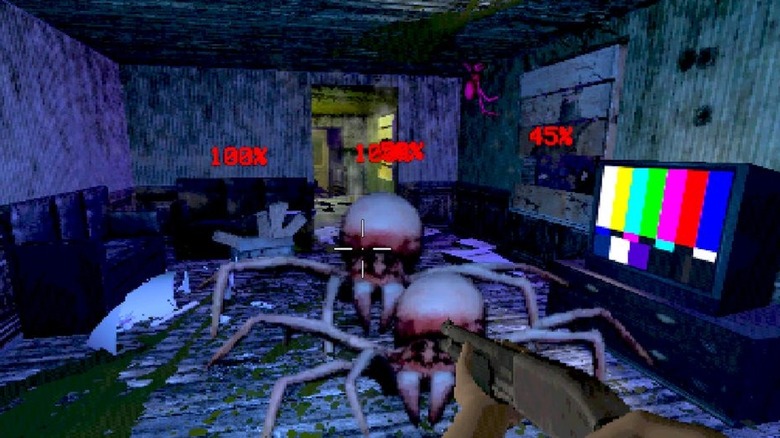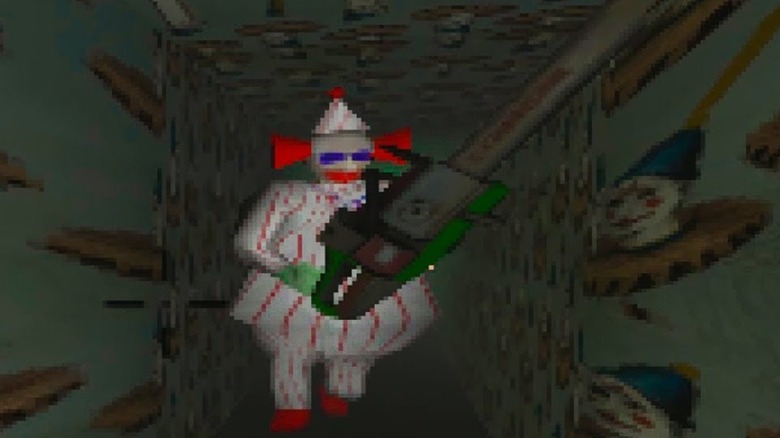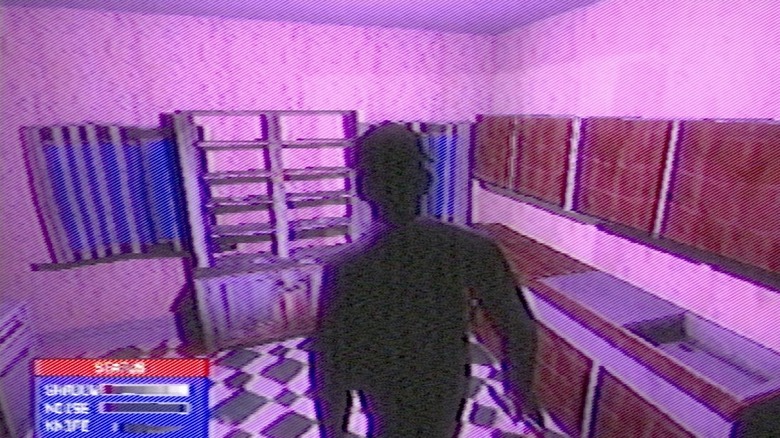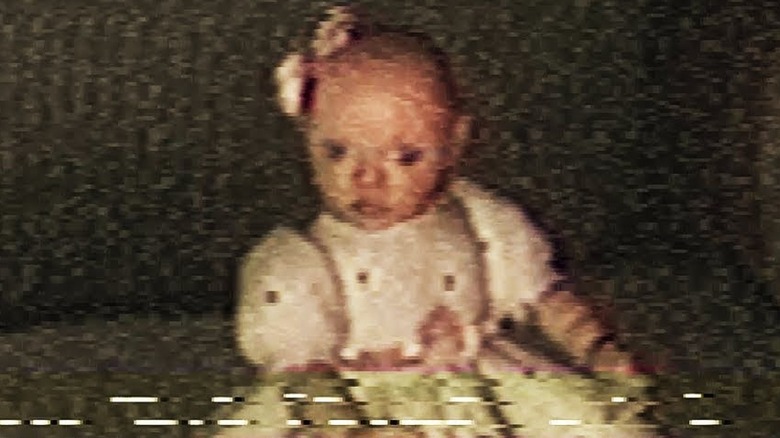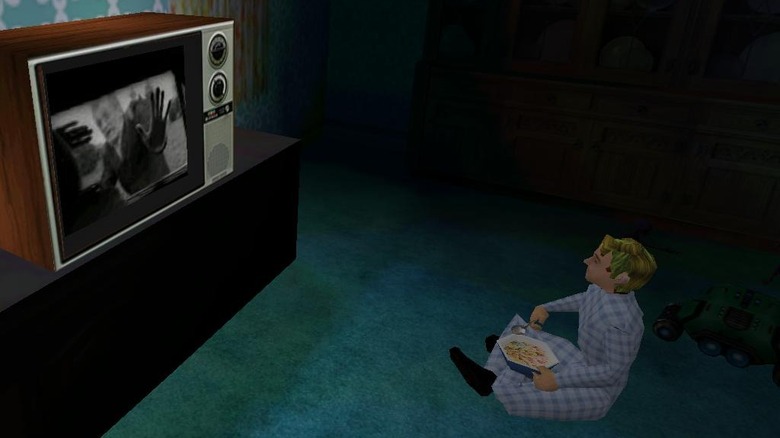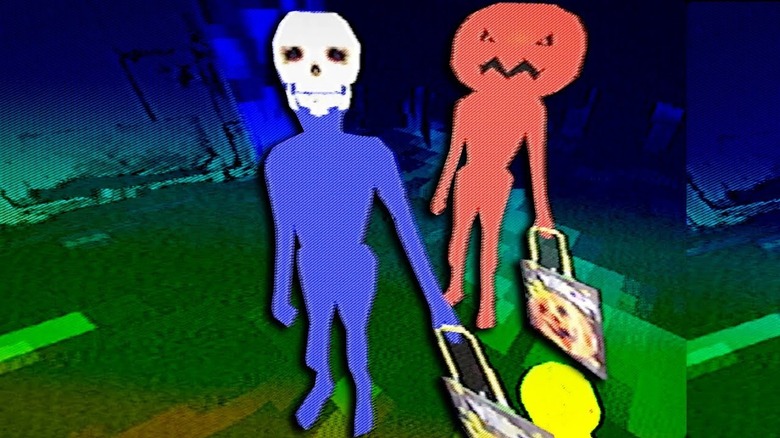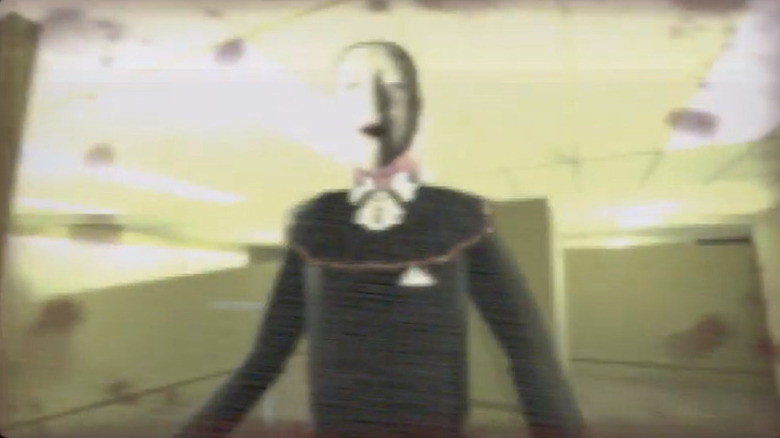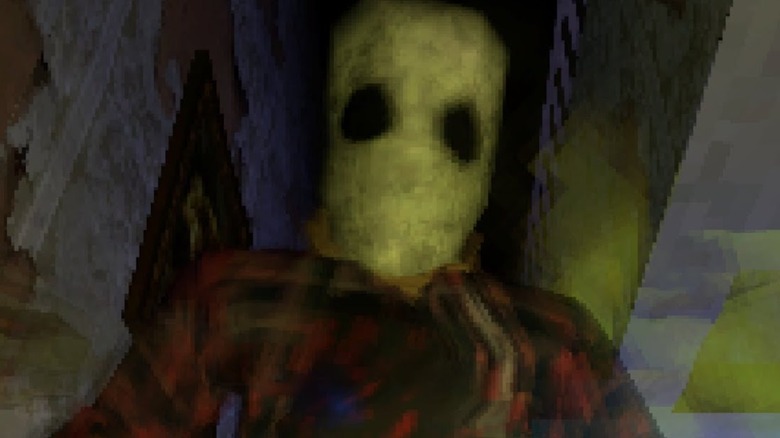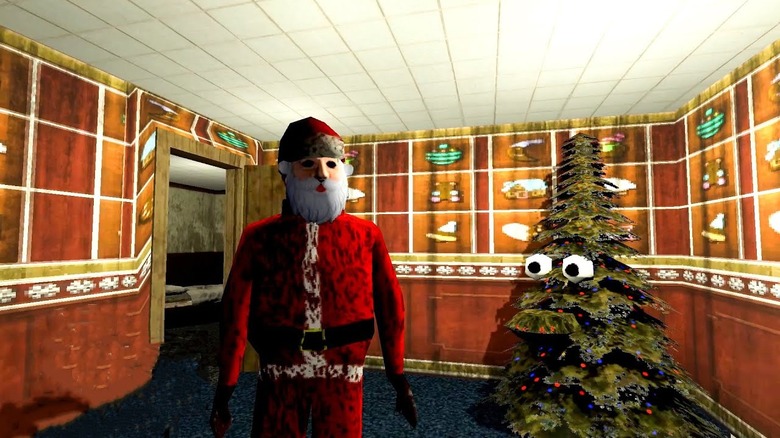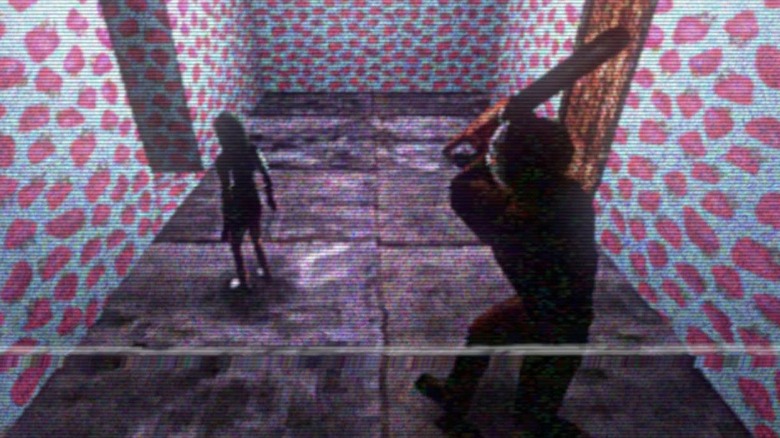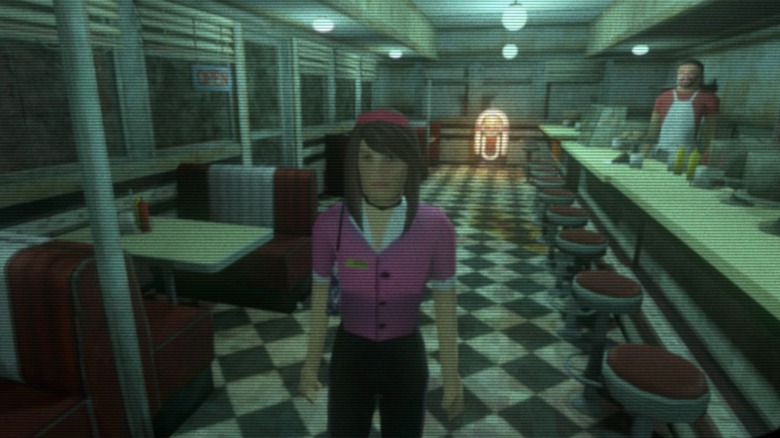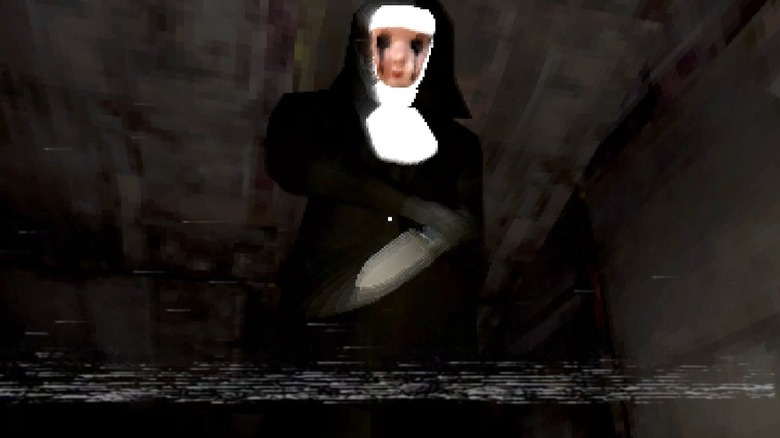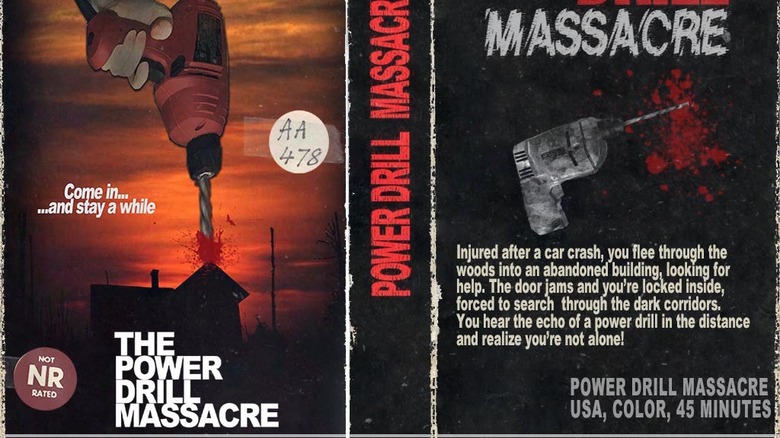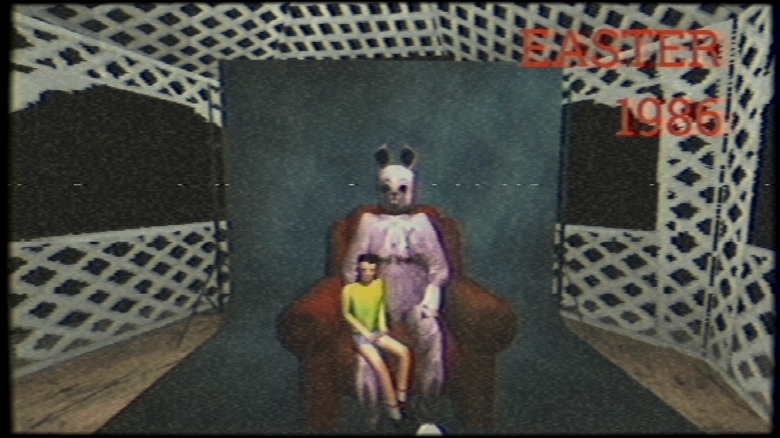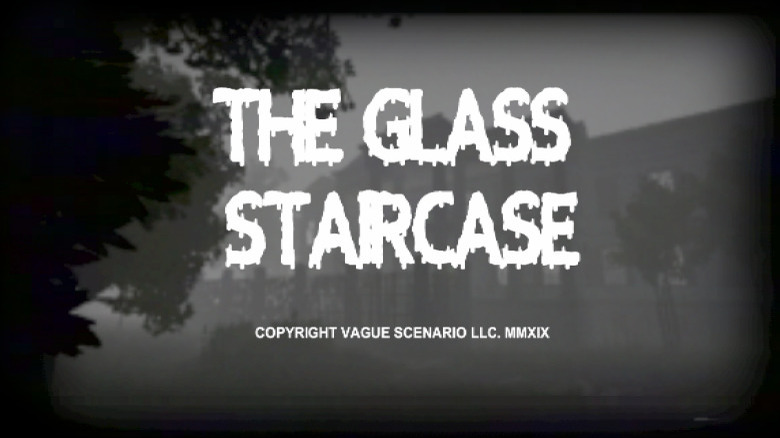Every Puppet Combo Game Ranked Worst To Best
While the "Resident Evil" franchise regularly reinvigorates the AAA horror scene, lower-budget indie horror games like "Phasmophobia" have been dominating YouTube and Twitch for the better part of a decade (per Uniongames). In recent years, as noted by NME, gamers have seen a revival of PS1 aesthetics in horror games, thanks to fan-made "demakes" and all new titles. Puppet Combo, the one-man studio behind such maniacally-titled indie slashers as "Babysitter Bloodbath" and "Power Drill Massacre," was born at this intersection.
Puppet Combo has been releasing games since 2013 and the brand's on Twitch, YouTube and Patreon has allowed it to publish other projects from creators in the lo-fi horror space. Puppet Combo's aesthetics are often based on slasher films from the 1980s, evoking the slew of low budget movies that made their way to homes via VHS tapes. In many Puppet Combo games, this VHS look is paired with PlayStation era survival horror gameplay (often including tank controls) to create the unique identity that's allowed the studio to grow its audience.
The studio also has multiple unfinished prototypes and published works from other developers on its Patreon page, as well as all of its completed works. Here are all of the indie darling studio's finished games ranked from worst to best.
Warning: The following games contain mature content not suitable for younger gamers.
17. Spiders
"Spiders" is a small game included in "Scary Tales Vol 1," a collection of shorter titles from Puppet Combo released in October 2019. As of yet, there has not been a second volume in this anthology series. Of the four games included in that first volume, however, "Spiders" has the least going on and it is probably the most easy-to-skip game within Puppet Combo's large catalogue of releases.
The best way to describe it is also sadly the most reductive. "Spiders" is more or less the "Call of Duty" Zombies mode, except with ever-increasing hordes of giant arachnids in the place of the undead. Players are tasked to board up the windows, grab a machete or rifle, and protect your family from invading spiders. Admittedly, the spiders are unsettling foes, but the lack of co-op and the sheer repetition of blasting spider after spider end up making this one an easy pass.
16. Evil Clowns
The other straight-up first-person shooter from Puppet Combo has a bit more substance than "Spiders," but still doesn't play to the studio's strengths especially well. "Evil Clowns" is a level-based shooter in the style of a classic "Doom" clone, in which you walk around collecting innumerable amounts of coins while you try to both kill and avoid the clowns that roam around the level. Like many Puppet Combo monsters, the clowns are deadly and move very quickly. As a result, you have to make sure to put some distance between you and them to get any hits in. And that last point makes it a bit of a frustrating experience.
On the bright side, the clown's designs are creepy and unpleasant, something Puppet Combo achieves even in its less noteworthy games. You can also see where the clowns are on your mini-map, which is nice for the type of experience Puppet Combo is trying to create — but it eliminates any sense of dread that could possibly come from being surprised by the clowns. At least the soundtrack is pretty banging.
15. Blood Maniac
One of the earliest Puppet Combo prototypes, "Texas Butcher," changed up the formula from many games based on slasher films, including Puppet Combo's later games. "Texas Butcher" was heavily inspired by "Texas Chainsaw Massacre," but with the twist that the player was the killer. This led to "Blood Maniac," which dropped the compact Texas vibe for a more suburban series of levels.
As you play as Larry the Butcher across five different stages, you must sneak around killing all the NPCs in the space. What doesn't really work here is the balance of the game's stealth. Characters often take two or three hits to go down, but once they're alerted to your presence, you only have five seconds to take them out before you are caught and have to start the stage over. You'll spend a lot of time sprinting after characters and clicking rapidly, only to be sent to the start of the stage. "Blood Maniac" features a solid concept, but it needed a bit more polish to lead to one of Puppet Combo's best games (more on that later).
14. The Riverside Incident
"The Riverside Incident" is another one of the short games included in "Scary Tales Vol 1." This a short (albeit slow-moving) first-person adventure in the style of "The Blair Witch Project." This found footage-style title is definitely a departure from the '80s aesthetics of most of Puppet Combo's games, leaning more into a trend that was big in the late '90s and early 2000s.
Incidentally, the game suffers the same fate as many found footage movies from that era: not a whole lot happens. There is a bit of exploring to do, but the most interesting parts of the game are in the narrative's framing and dark ending. It's a short game and there is no fail state, but there is also no running, so it can simply feel quite slow at times. Still, it's not very long and worth playing to the finale to make up your own mind about what happens in the end.
13. Babysitter Bloodbath
One of the earliest Puppet Combo games, "Babysitter Bloodbath" released in 2013 and established the formula many of the studio's later hits would adapt and improve upon. The player must solve puzzles and explore a house as a killer stalks and hunts them. This structure went on to be the basis of a great deal of Puppet Combo's future work and inspired a novelization. Unfortunately, this one just doesn't hold up to the newer games in the catalogue.
The game takes inspiration from John Carpenter's "Halloween," which follows Laurie Strode as she's attacked by Michael Myers while she babysits a neighbor kid on Halloween night. In "Babysitter Bloodbath," you play as a teenage babysitter who has to survive an attack from local asylum inmate Neokalus Burr, who breaks out on a murderous rampage.
Sound familiar? Why, yes, it is exactly the plot of "Halloween." The game knows this and isn't exactly subtle about it, either. But between the plodding controls and the lack of narrative depth future games would have, it's safe to say you aren't missing out on a ton if you don't dig into this one. Later Puppet Combo games simply did this better.
12. Samhain
This short game doesn't get talked about as much as many of the other Puppet Combo releases. A main reason for that might be that it's not really scary. Of course, there is a certain sense of dread to "Samhain," which is advertised as "pagan horror," but often the game is just as morbidly funny as it is creepy. That fact alone makes it unique among the Puppet Combo catalogue and worth seeking out if something a little more lighthearted suits you.
You play the game as an older brother, walking your siblings down a path to go trick-or-treating. One has a pumpkin for a head; the other has a skull on top of his frame. As you go door to door, you are told not to wander from the path, and each resident keeps giving you one body part after another. It's truly weird and almost comical — but when your brothers disappear, you begin to wonder if something is out to get you, or if you are part of some grander ritual.
11. Day 7
2019's "Day 7" is a unique and polarizing game, even among the assortment of horror oddities that Puppet Combo has created. This first-person exploration game begins as the player character Terrence feels bored in his routine 9-to-5 office job. Relatable so far, right? He has a brief friendly encounter with a woman on the subway home, beating himself up later about not asking her out. Before he gets home, he blacks out — and then wakes up in an office maze where the rest of the game takes place. What follows is a slowly-paced surrealist adventure that the creator admits is their least favorite game they've made.
"Day 7" is a horror game about the mundanities of life and work, but i's hallways are confusing and it's easy to get lost in the puzzles. Ultimately, its story is vague and that fact may leave some players feeling underwhelmed by the experience. Nevertheless, its eccentricities make for an interesting horror game that definitely stands out from the rest of Puppet Combo's work.
10. Feed Me Billy
Another one of the four short games in "Scary Tales Vol 1," "Feed Me Billy" is a brief bit of first-person narrative horror. You wake up as Billy and immediately receive a call from a deep-voiced man telling you that you have been sent a package. Opening the package reveals that it contains a clown mask and a revolver. Then, in a Cronenberg-ian body horror twist, there is a fleshy hallway behind Billy's bed where a hungry hole with teeth lives. "Feed me, Billy," he tells you.
This Puppet Combo short is an absolutely surreal nightmare. It depicts the end days of a loyal cult member-turned-serial killer in a first-person narrative game. As Billy, peering through the eye slits of a clown mask, you must commit a series of murders in order to feed the hole and bring about the end times. It really isn't much more complicated than that, but it is a fantastic little tone piece.
9. Night Shift
"Night Shift" is another exploration of mundane modern life, but this one is more successful than "Day 7" by virtue of being briefer in runtime and a bit less surreal. Of course, to some, the surrealism of "Day 7" could be an advantage. However, "Night Shift" operates purely in the realm of more grounded and rational fears (and serial killers), which allows it to create a sense of mounting dread.
In "Night Shift," you play a clerk at a gas station, working alone through (you guessed it) his night shift. You work through a to-do list from your boss and the occasional customer who will come in and make you uneasy. The game progresses with a general sense of discomfort as you do your nightly menial tasks. This is all just set up for a terrifying jump scare, of course, but it is also a deliberate exercise in slowly ratcheting up the tension by messing with the player's mind and expectations. It's also easily the best of the "Scary Tales Vol 1" collection of games.
8. Christmas Massacre
"Christmas Massacre" takes and refines the mechanics of "Blood Maniac" and places it in a Holiday setting. Influenced by "Silent Night, Deadly Night" and the slew of Christmas horror films like it, "Christmas Massacre" re-tells the killer Larry's origin, placing him at the center of a massacre of boarding school nuns on Christmas day — which is actually a recurring setting and concept in Puppet Combo's games.
The game is much less strict when it comes to stealth, meaning it isn't nearly as punishing as previous iterations of Puppet Combo's slasher sims. Instead, the levels are more open and require less repetition than "Blood Maniac," allowing you to focus more on the stalking of victims than mastering a level's tricky passages to the point of perfection.
"Christmas Massacre" has a B-movie charm to its story, wherein a talking Christmas tree is telling Larry to kill, kill, and kill more. It's a fun messed-up arcade game, and the best Puppet Combo has made in that style to date.
7. Buzz-Saw Blood House
A truly disturbing game unlike any other across Puppet Combo's years of horror games, "Buzz-Saw Blood House" takes inspiration from snuff horror. For some gamers, that might bring to mind Rockstar Games' long-dead franchise "Manhunt," but in reality this game is much darker than those.
You play as different teenage girls who have been kidnapped and forced to participate in a series of level-based obstacle courses. It is the late 1990s and these broadcasts are being streamed out to an audience on the dark web. What really makes this experience disturbing is seeing a simulated live-chat at all times (language warning), showing the viewers' darkest, deepest desires and as your character is brutally murdered again and again. The game is extremely hard — in many cases punishingly so — and that can be quite off-putting. But it almost feels like that's the point: to entertain the show's horrific audience.
"Buzz-Saw Blood House" is a truly disturbing game that ranks highly for that aspect alone, and fans have commended the game for it's atmosphere, regardless of issues with the difficulty level.
6. The Night Ripper
"The Night Ripper" is another original slasher from Puppet Combo, the type of game with which the studio made a name for itself. You play as Rachel as she comes home from a movie, but ends up being stalked by the titular killer. Like Jack the Ripper but wearing a distinctive and disfigured duck mask, the Night Ripper follows Rachel through the game's levels as you try to find change to call for help. "The Night Ripper" game focusing on dread and recreating the aesthetics of VHS tape horror — and it remains one of Puppet Combo's best looking games.
You can hide, and often you have to run, all while you micro-manage the panic meter that fills up when the Ripper gets close. When that gets to the top, it is game over for Rachel. While "The Night Ripper" doesn't have as much depth as some of the games that came later (in terms of both its story and mechanics) but it is undeniably terrifying and remains a fan favorite despite some lag issues.
5. Night Watch
This game is one of the more recent and experimental entries Puppet Combo's catalogue, but it stands out from the rest of their games for one reason. In "Night Watch" — a game with an initial premise that could be reduced down to "it's a creepy 'Firewatch'" — the player character finds a computer disk (this is the 90s, folks) that he can insert in the machine back at the watchtower. This launches the part of the game that engages the player in a text adventure with three separate outcomes.
The paranoia of playing a horror text adventure eventually blurs with the actual horrors that lurk outside the comforts of the watchtower. The result is unsettling in the way many Puppet Combo games are, and yet it departs from what fans are used to, gameplay-wise. It also features one of the best endings in the entire collection — one that is terrifying in its own, right but also widens the universe and connects "Night Watch" to the studio's other works. This is a must for Puppet Combo fans.
4. Nun Massacre (a.k.a. Night of the Nun)
The terrifying "Nun Massacre" is best played at night with the lights off. Or may it's best watched on YouTube in the light of day while your favorite streamer screams in the corner of the frame; that's how scary it is.
"Nun Massacre" is a hide and seek-style game where you play a mother searching for her daughter in a Catholic boarding school. You are chased by a terrifying nun as you solve puzzles and find your way through the locked doors of the puzzle-box of a building.
Aside from forcing you to hide and run from one of the scariest monsters ever, "Nun Massacre" also has a pretty robust story, complete with multiple endings. The plot has a number of threads that tie together in satisfying ways, and the specific religious themes that run through many Puppet Combo games come to the forefront here. "Nun Massacre" also starts a move towards a more satisfying stealth system, getting away from one-hit kills and encouraging hiding and stamina management over simply running for the hills.
3.. Power Drill Massacre
A Puppet Combo classic, "Power Drill Massacre" debuted in 2015 and still holds up as one of the studio's moodiest and most frightening games. The lack of a nuanced story doesn't work against it, as the static-filled radio broadcasts that bookend the game paint a specific setting of a time and place. As "Power Drill Massacre" opens, you wake up as Megan, who has just survived a car crash. Fleeing through the woods looking for help, Megan stumbles upon the seemingly-abandoned industrial building where the rest of the game takes place.
The controls and camera bring to mind the early "Silent Hill" games, as does the color palette and PS1-style graphics. It is a fairly simple game about exploring the building and finding three keys in order to unlock a final door, but the game's multiple endings make for an interesting experience. Saying much more for anyone who hasn't played it would ruin the discovery, but "Power Drill Massacre" is a landmark indie horror title with some of the best jump scares in gaming.
2. Murder House
"Murder House" is one of the best Puppet Combo games, as well as the studio's most polished. The perfectly eerie game is fully voice-acted, which helps it to capture the B-movie vibes Puppet Combo is going for. It also has great classic survival horror-controls and excellent pacing, making "Murder House" the most well-realized combination of slasher aesthetics and PlayStation era gameplay that the studio has achieved yet. It is still a short game by AAA standards, but the pacing throughout is excellent — starting at the beginning.
The 20 minute intro sets up the game's terrifying Easter Ripper, a villain based on decades of campy slasher villains. It features a fantastic cut to the title credits that will make you jump, even when you know it's coming. The main game takes place years later, as you play a journalist investigating a house where the famous serial killer grew up. Of course, despite reports to the contrary, the Ripper isn't dead. The story here is concise and well-told, and the extended cut adds a fun mind-bending twist that adds even more punch to the ending. It's no wonder some critics called "Murder House" the scariest Puppet Combo game.
1. The Glass Staircase
"The Glass Staircase" might not be as well-known among fans as "Power Drill Massacre" or "Murder House," but it contains all of the best elements of Puppet Combo's previous games, even going above and beyond to feel like something that could have existed as a lost PS1 or early PS2-era title from some defunct Japanese studio.
Featuring an appropriately fear-inducing story, memorable jump scares, and "Resident Evil"-style door transitions for loading screens, this game is the strongest homage Puppet Combo has made, as well as one the studio's most original games aesthetically.
"The Glass Staircase" eschews the slasher and VHS aesthetic that dominates Puppet Combo's catalogue for an early 20th century mansion and a story that takes influence from Italian zombie movies of the early 1980s. You play as a set of four young girls trapped in the mansion of a mad doctor, who slowly begin to discover the monstrous secrets the doctor has been keeping.
While many Puppet Combo games give players weapons at the end in order to finally conquer the slasher villain, the entire second half of "The Glass Staircase" is focused on frantic gunplay. The shooting particularly evokes older PS1 survival horror titles, but the whole thing reads as one of the most loving tributes to classic "Resident Evil" and its ilk ever made.

